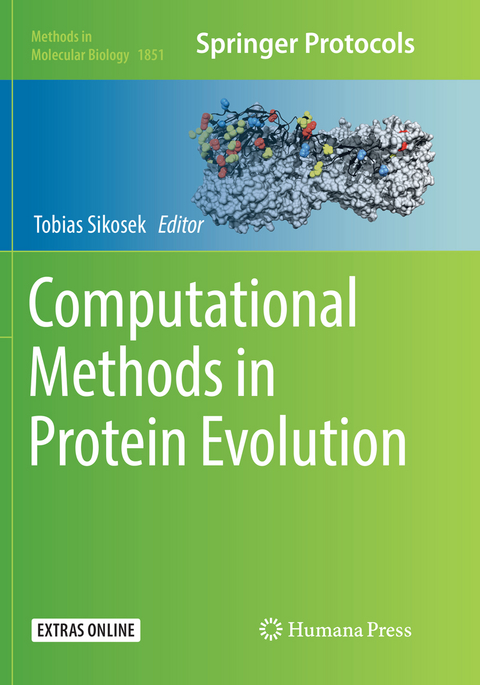
Computational Methods in Protein Evolution
Humana Press Inc. (Verlag)
978-1-4939-9378-9 (ISBN)
Cutting-edge and authoritative, Computational Methods in Protein Evolution is a valuable resource that offers useful workflows and techniques that will help both novice and expert researchers working with proteins computationally.
Predicting the Effect of Mutations on Protein Folding and Protein-Protein Interactions.- Accurate Calculation of Free Energy Changes Upon Amino Acid Mutation.- Protocols for the Molecular Evolutionary Analysis of Membrane Protein Gene Duplicates.- Computational Prediction of De Novo Emerged Protein-Coding Genes.- Coevolutionary Signals and Structure-Based Models for the Prediction of Protein Native Conformations.- Detecting Amino Acid Coevolution with Bayesian Graphical Models.- Context-Dependent Mutation Effects in Proteins.- High-Throughput Reconstruction of Ancestral Protein Sequence, Structure, and Molecular Function.- Ancestral Sequence Reconstruction as a Tool for the Elucidation of a Stepwise Evolutionary Adaptation.- Enhancing Statistical Multiple Sequence Alignment and Tree Inference using Structural Information.- The Influence of Protein Stability on Sequence Evolution: Applications to Phylogenetic Inference.- Navigating Among Known Structures in Protein Space.- A Graph-Based Approach for Detecting Sequence Homology in Highly Diverged Repeat-Protein Families.- Exploring Enzyme Evolution from Changes in Sequence, Structure, and Function.- Identification of Protein Homologs and Domain Boundaries by Iterative Sequence Alignment.- A Roadmap to Domain Based Proteomics.- Modelling of Protein Tertiary and Quaternary Structures Based on Evolutionary Information.- Interface-Based Structural Prediction of Novel Host-Pathogen Interactions.- Predicting Functions of Disordered Proteins with MoRFpred.- Exploring Protein Conformational Diversity.- High-Throughput Antibody Structure Modelling and Design using ABodyBuilder.- In Silico Directed Evolution using CADEE.
| Erscheinungsdatum | 06.12.2019 |
|---|---|
| Reihe/Serie | Methods in Molecular Biology ; 1851 |
| Zusatzinfo | 80 Illustrations, color; 23 Illustrations, black and white; XIII, 420 p. 103 illus., 80 illus. in color. |
| Verlagsort | Totowa, NJ |
| Sprache | englisch |
| Maße | 178 x 254 mm |
| Themenwelt | Naturwissenschaften ► Biologie ► Biochemie |
| Naturwissenschaften ► Biologie ► Mikrobiologie / Immunologie | |
| ISBN-10 | 1-4939-9378-X / 149399378X |
| ISBN-13 | 978-1-4939-9378-9 / 9781493993789 |
| Zustand | Neuware |
| Informationen gemäß Produktsicherheitsverordnung (GPSR) | |
| Haben Sie eine Frage zum Produkt? |
aus dem Bereich


